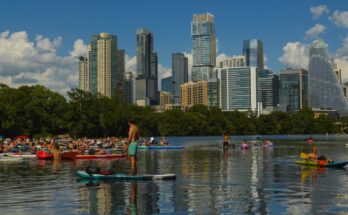LAKE BUENA VISTA, Fla. — Inside and outside of ESPN Wide World of Sports Complex, there’s far less tension over the sturdiness of the NBA bubble experiment than the uncertainty of the NBA’s next season. The league’s owners are desperate for customers returning to the stands and suites, for the NBA’s game-night machinery to regenerate lost revenue.
Privately, this is a league constantly asking commissioner Adam Silver and his understudies: What’s next?
As the league starts to frame the possibilities, they’re telling teams simply: The priority for 2020-21 is playing 82 games and playing as often as possible with fans in the seats. For now, those conversations are ongoing, numerous and forever evolving.
Mostly, the NBA is trying to live in the real world, where science and data govern reality — and that has left everyone scrambling for solutions in a country with no national plan for a virus killing a thousand Americans a day.
Is the NBA flexible on Dec. 1?
The NBA has told teams that the plan remains to start on Dec. 1, but pushing back that date would require a level of confidence that a delay would ultimately result in the reopening of arenas to the public.
If so, the NBA would be willing to hold back the start — perhaps even months. An opening night of Martin Luther King Jr. Day — Jan. 18 — is a consideration. February and March are realistic, too, if a combination of vaccines, therapeutics and rapid-response testing for COVID-19 could contribute to the possibility of public gatherings.
There’s hope for vaccines, but the league has prepared teams for the reality that mass distribution would be unlikely for a full year, sources said. For now, too, there’s a skepticism about the reliability of rapid-response testing. They’re hopeful that advances in the technology could facilitate ways to get fans into arenas — even if it means less than capacity. Teams are already modeling options that include a few thousand fans to buildings filled closer to capacity.
So what if no arenas — or a scant few — are able to host fans in December?
In most NBA venues, it’s almost a certainty that mass sport gatherings are unlikely early this winter.
The NBA will consider playing games in practice facilities that are more cost-effective and more easily repurposed for television, sources said. Another idea: What if some markets could house fans, but others can’t? That has opened a conversation about neutral-site games. NBA teams could move operations to other league cities — or more likely, non-NBA markets — that could allow for paying customers.
For example, New York, Los Angeles and Washington could lag in the ability to reopen. Toronto can’t be sure that Canada’s borders will reopen to traveling parties from the United States. That would necessitate the Toronto Raptors finding a home in the United States.
So those are far less likely scenarios than the NBA starting next season where it plans to end this summer, right?
Yes, the bubble.
This time, ideas center on regional sites and windows of participation that would extend a month for teams, sources said. After that, teams would go home and train — perhaps for two weeks — and move onto the next regional bubble against a new pod of teams. Orlando is a consideration, and Las Vegas — a finalist for this summer’s restart — would reemerge as a possible site too, sources said.
This is one of the ideas, a way to buy time until fans could return to arenas. NBPA executive director Michele Roberts is on the record with ESPN’s Tim Bontemps as endorsing the idea — if the country remains flummoxed by the virus: “If tomorrow looks like today, and today we all acknowledge — and this is not Michele talking, this is the league, together with the PA and our respective experts saying, ‘This is the way to do it’ — then that’s going to have to be the way to do it,” she told ESPN.
Why a Dec. 1 start date for the 2020-21 season?
Christmas Day games are crucial to the NBA on a lot of levels, but the NBA needs a window to play 82 games, complete the playoffs and still allow its players the chance to participate in the 2021 Tokyo Games in July.
These are noble intentions, but there’s increasing skepticism within the league about how long accommodating the Olympics can remain a priority.
For now, here’s one idea on the league’s whiteboard, sources said: If the NBA believes it can significantly push back the start of the season to buy time on getting fans back into arenas, they’ve brainstormed the idea of a month-long Olympic break reminiscent of how the NHL has handled the Winter Olympics.
As the pandemic rages on, there’s less optimism about the elite players participating in the Olympics — including Americans and international stars. The NBA and NBPA will take positions that the Games are important, but the Olympics are barely a priority for the owners — especially when they don’t share in the television revenue that originates from the inclusion of the league’s superstars. Organizations see the wear and tear on players in whom they’ve invested hundreds of millions of dollars. Amid a pandemic, the Olympics mean even less to owners, team executives and the NBPA.
At a minimum, Team USA probably will have to be prepared to bring a much younger, less accomplished roster to Tokyo — a team profile that could ultimately mirror the rest of the world’s entries, too.
Were those teams chasing the Western Conference’s play-in tournament thrilled with the Utah Jazz‘s decision to sit four starters with injuries and rest center Rudy Gobert in a loss to the San Antonio Spurs?
Among teams trying to catch the Memphis Grizzlies for the eighth seed, they were somewhere between displeased and livid, sources said.
The Jazz violated none of the league’s resting rules with Gobert, and properly documented injuries to four more starters, but the optics of the starting five sitting out in an eminently winnable game against the Spurs were harsh.
Memphis, the Portland Trail Blazers and the Phoenix Suns are in hot pursuit of the eighth seed and play-in, and that was a crucial victory for San Antonio, which is now one game behind Portland for ninth place — and a half-game ahead of Phoenix.
What’s more, the Jazz play the Spurs in the eighth and final seeding game Thursday, and it isn’t hard to imagine that Utah — with its playoff position possibly set — could be less inclined to risk injury to its key players in that game, too.
These are the kind of issues that come with the final days of every NBA regular season. It all lands differently in the restart format, especially with teams that came to Florida with intentions of getting a fair shot to make the playoffs.
More and more, teams will start resting players down the stretch, and it could have a dramatic impact on those teams competing to get into the playoffs.
The NBA has warned teams about preserving the integrity of this pursuit, but there are limits on how far they can go in the enforcement.
Is the Orlando bubble a possible destination for the eight teams left out of the restart to run offseason training camps once the first batch of 22 teams are eliminated?
The NBPA has no interest in that idea, sources said. It’s a non-starter. The inevitable solution for the eight teams left out of Orlando: The NBA and NBPA agreeing upon voluntary workouts in the team facilities, sources said.
The NBPA won’t agree to mandatory reporting for players on the eight teams outside of the restart but will eventually allow it on a voluntary level, sources said. Several of the teams are frustrated and angry over how far they feel they’re falling behind the teams in the bubble, and are aggressively voicing that to the league office.
“We are looking at nine months between games now, and if the season is delayed, we are looking at possibly a full year between competitive games,” one GM told ESPN on Friday. “That’s unprecedented in the history of the sport. We deserve help here.”
Does Jacque Vaughn have a chance to keep the Brooklyn Nets head-coaching job?
Brooklyn’s planning to start a search once the team is eliminated in Orlando — with Vaughn assured of getting significant consideration to keep the job. It would’ve been easier to evaluate Vaughn for the job with his two superstars — Kevin Durant and Kyrie Irving — participating in the restart, or even a few of the missing Nets starters, but he has made a good case to GM Sean Marks.
How about Alvin Gentry and the New Orleans Pelicans?
Executive VP David Griffin and Pelicans ownership have a decision to make with a year left on Gentry’s contract, sources said. Consider two relationships Griffin has back to his front-office days in Cleveland and Phoenix, respectively, if there’s a change in New Orleans: LA Clippers assistant Ty Lue and Los Angeles Lakers assistant Jason Kidd, sources said.
Where are the Chicago Bulls on Jim Boylen’s future?
Arturas Karnisovas and Marc Eversley are spending time evaluating and getting to know Boylen, and remain in no rush deciding on the coach’s future. They’re able to watch him in the gym with players, talk philosophy and learn about his staff.
Because several potential head-coaching candidates among the assistants’ poll are coaching in the bubble for the foreseeable future, there’s even less rush to open up a search process now.
Have the NBA and NBPA progressed in talks on the 2020-21 salary cap?
Front offices and agents are desperate to know where the salary cap will land for next season, but those talks have yet to begin between the NBA and NBPA, sources said. The audit of the league’s basketball related income (BRI) is still ongoing, and the numbers on the revenue split between the sides is needed before negotiations can get underway. That probably will come later in the month.
The heaviest heart in the bubble on Friday?
It belonged to Toronto president of basketball operations Masai Ujiri over the death of Nigerian 7-footer Michael Ojo in Serbia. Ojo came to America on a college scholarship because of his emergence at Ujiri’s Giants of Africa camps in 2010 and 2011.
“What a person,” Ujiri said. “What a gentle giant.”


